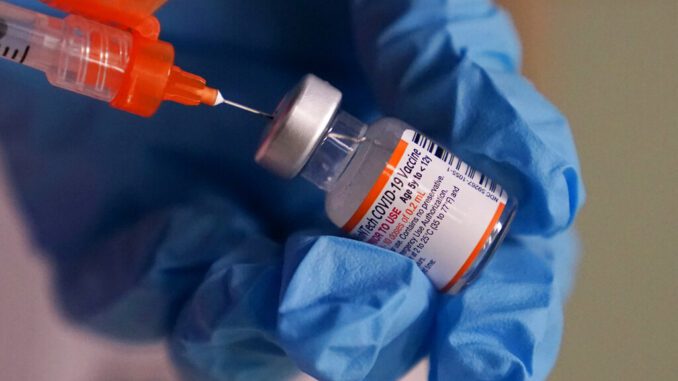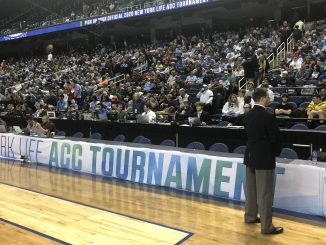
RALEIGH — A body with the ability to alter immunization requirements has tapped the brakes on adding COVID-19 vaccination requirements for students 17 and up.
The N.C. Commission for Public Health (NCCPH) is the only other body in the state besides the legislature which can alter immunization requirements for K-12 public school students. The NCCPH is housed within the N.C. Department of Health and Human Services. (NCDHHS).
The NCCPH voted unanimously to deny the petition. The motion made included directions for the commission’s staff and legal counsel to draft a letter of denial which will be circulated to the other members before being sent.
Prior to the vote, members Dr. Gene Minton and Dr. Michael Riccobene both voiced support for denying the petition.
“I think that based on the fact there is an especially high incidence of adverse effects in children and adolescents – particularly myocarditis and those type things – that we would really be making a not wise choice to require the least affected population of this country, which would be students… adolescents and children…to have the most stringent requirement,” Minton said.
Minton added he is a strong proponent of vaccinations for those who need it and restated that they should not be requiring it of those who least need it. He also noted there are no long-term studies on the adverse effects of the vaccines on kids.
“I am a 52-year-old with hypertension and high cholesterol and I am a frontline healthcare worker and I have chosen to be vaccinated and boosted and I believe I have acquired natural immunity,” said Riccobene. “I am a proponent of people in high-risk categories to being vaccinated, however, I do strongly believe in people’s personal freedoms.”
Riccobene continued, “I have chosen not to vaccinate my children. I think every parent and adult should have the right to choose whether or not they receive the COVID vaccine. I do not think it is in the best interest of the public to take away that right.”
Dr. Doug Sheets remarked that he had contacted the medical society and said that “the feeling” of their board of directors was they “could not currently support any COVID vaccine mandate for minors.”
During the earlier discussion, the commission’s counsel John Barkley of the N.C. Department of Justice laid out the rule-making process and cited the authority of the commission to decide for K-12 students.

Appalachian State University Professor Stella Anderson, one of the petitioners, was also given a chance to speak prior to discussion by commission members.
Anderson claimed there are other states where state institutions were requiring vaccination of college students.
“From our perspective, the vaccine requirement for North Carolina’s four-year college and university students is actually overdue,” said Anderson. She said that perspective is “shaped by our first-hand experience with voluntary vaccine uptake.”
Anderson said some areas have high rates of vaccination of college students but that is not the case in other pats of the state. She said her campus started the year at a 52% fully vaccinated rate and complained it took “five months for us to get to 70.” Anderson then said that as of January, her school was at 80%.
“So, we speak from personal experience as educators that the vaccine is needed for general safety and because in its absence it’s extraordinarily disruptive to all campus operations,” Anderson said. “It is crucial to our ability to remain on campus with students residing in dorms and in face-to-face classes.”
Another factor playing into the commission’s decision was a letter to the chair prior to the meeting calling the possible changes “premature.”
The letter was signed by three NCDHHS officials including State Health Director Dr. Elizabeth Tilson as well as Mark Benton, the assistant NCDHHS secretary and Dr. Kelly Kimple, chief of the NCDHHS women’s and children’s health section.
“With information about vaccine doses and booster scheduling still evolving, we believe it is premature for the Commission to codify the immunization schedule through rulemaking. The Commission could consider adding a COVID-19 vaccine to the childhood immunization schedule at a later date,” the NCDHHS letter reads.
Kimple reaffirmed the contents of the letter during the meeting.
As of Feb. 1, 25% of kids ages five to 11 have had at least one dose as have 47% of kids ages 12 to 17. Additionally, NCDHHS reports 69% of kids five and up and 73% of kids between 12 and 17 have received either one booster or an additional dose.
Had the NCCPH moved forward, the legislature would be able to intervene as such rules are subject to the Administrative Procedures Act (APA) when and if a rule receives objections from 10 or more persons.
Near the beginning of a meeting held on Nov. 3, 2021, NCCPH Chair May first mentioned the petition but did not say what the topic was, only that commission would be reviewing it and “very likely at the next meeting” the commission would take it up.
North State Journal inquired with NCDHHS about the unnamed petition and discovered it was sent to State Health Director Dr. Elizabeth Cuervo Tilson last October.
The petition was submitted by four professors from Appalachian State University (ASU) including Anderson. The request was for the NCCPH to change state immunization requirements to include COVID-19 vaccinations for “individuals 17 years of age or entering the 12th grade, whichever comes first, on or after July 1, 2022.”
A letter signed by over 200 UNC system staff and faculty accompanied the petition. The letter cites state law that gives the NCCPH authority to alter immunization requirements for students and says, “We respectfully request that the Commission issue an order declaring that the COVID-19 vaccine be required of all college students attending NC colleges and universities.”
Following the meeting and Anderson’s remarks, it remains unclear why the petitioners feel forced student vaccinations are warranted given there is no standing vaccination requirement for any other group of individuals in the state. The only mandate that comes close is Governor Roy Cooper’s order for cabinet-level employees, however, even they have the option of being tested weekly instead.
According to the National Academy for State Health Policy, there are 17 states with laws banning a COVID-19 shot requirement for school kids, whereas just four states including California, Illinois, Louisiana, New York plus the District of Columbia are mandating it.
In the case of California, a judge ruled last month that the San Diego school district could not require the vaccination. Democratic lawmakers in that state are seeking to get around that ruling through proposed legislation that would apply to all K-12 students in California.
In neighboring South Carolina, the state’s Senate is considering a bill passed by the state House in December that would ban any type of COVID vaccine mandate statewide. The bill’s protections would include K-12 students.
The next meeting of the NCCPH is scheduled for May 4, 2022. No meeting details are yet available.



